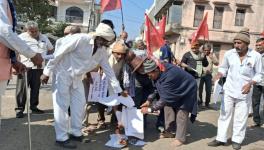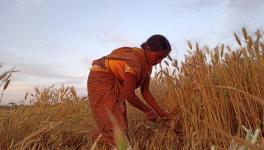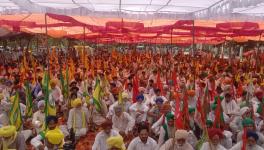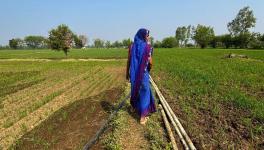A Never Ending Nightmare Is Haunting Us: Bundelkhand Farmers on Loans, Middlemen
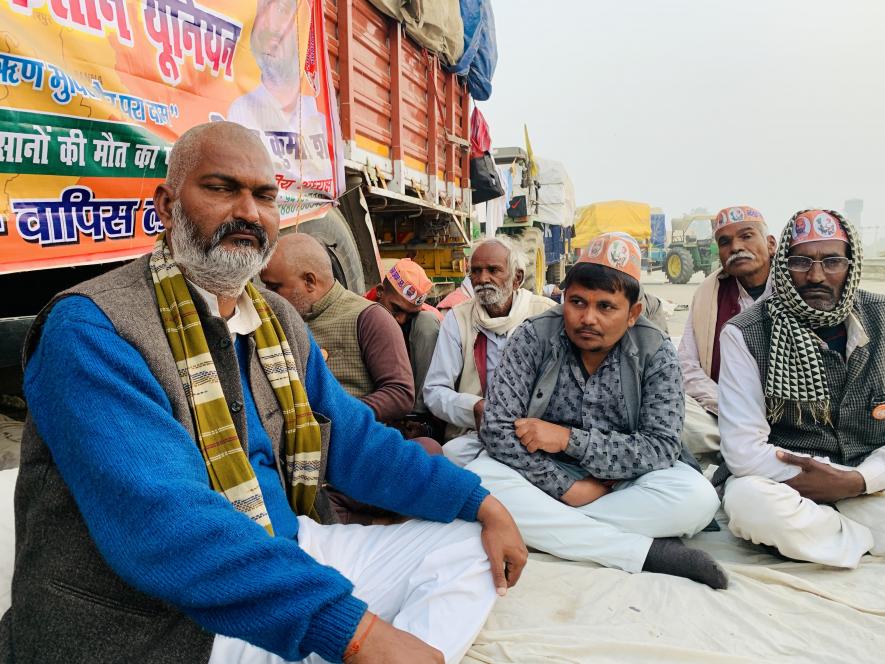
“What do you do when banks run after you to repay the loans and your sole hope for any money has perished due to excessive rains or drought? You choose death,” these hard hitting words are of Sushil Khewaria, one of the farmers who is camping along with his friends at the National Highway 2 in Haryana’s Palwal to protest against the recently enacted three farm laws.
Khewaria, a member of the Bundelkhand Kisan Union, said that the farmers in the Bundelkhand prefer to grow oil seeds and pulses as the climatic conditions suit the crops in this semi-arid region spanning across 13 districts in Uttar Pradesh and Madhya Pradesh. However, frequent weather change in recent years have brought immense misery and piling debts for farmers.
He explained that even though returns have been diminishing, the farmers cannot leave agriculture altogether because the land will then become infertile and families will have to completely depend on markets for food supplies.”We simply cannot afford it,” he said.
Talking about the reason behind the unprecedented mobilisation of farmers against the laws, Dinesh Kumar Niranjan, a young farmer from Teekamgarh in Madhya Pradesh said, “Are they not aware about our suffering that they brought such an important law without any consultation or dialogue? Today, Bundelkhand has the highest rate of farmers’ suicides after Vidarbha.”
He had sowed sesame in his one acre farm, and explained the calculations about costs and returns to NewsClick, “The sowing of sesame requires the land to be ploughed twice before the seeds are spread. That alone costs Rs 2,400. Then the seeds cost Rs 600 and the worker has to be paid Rs 1,000 for three days of sowing.”
He further added, “Following sowing, we need to water the fields which is done through pumps that consume diesel worth Rs 2,400. The cultivation also requires additional labour, costing upto Rs 4,500. Then comes the spraying of herbicides and pesticides which incur additional Rs 2,000 each and the workers take Rs 2,000 per head. For cutting the harvest, the workers need to paid Rs 6,000. Bundling, Transportation and extraction would take another Rs 4,000. If you add other costs, the total expenses borne out of pocket would be around Rs 30,000 per acre.”
Also read: Farmers’ Protest: No, Punjab Farmers Aren’t Rich; Over 40% in a Debt Trap
However, due to unexpected rains this year, Niranjan’s crop perished. He could produce only 30 kg of sesame seeds which would be sold for Rs 2,100 only. “In normal weather conditions, I would have got four quintals of sesame which in turn fetch Rs 32,000. If demand is high, I would be getting Rs 40,000. So, I am basically saving Rs 2,000 to Rs 8,000 for my household expenses for five months. This is why we migrate to cities in search for work. If you see any well built home in the village, please be sure that the family has two or more family members working in the cities,” he said.
Next to Niranjan, farmer Uma Singh, clad in a shawl, muttered in a low voice, “Who would send his 16-year-old boy to work as a labourer, when even his childhood is not over fully? But, if he does not go, how will his sister get married? It’s a nightmare for us which does not end ever.”
Responding to a question about why the farmers are opposing privatisation, Singh said, “We have seen with our own eyes the havoc such policies (privatisation) have wreaked on our public sector institutions. Our schools have been closed and private schools are flourishing, our hospitals have been privatised. Leave everything, even electricity has been privatised leading to the situation where a normal rural household needs to pay Rs 2,100 per month. We all watched it silently. But when the government is now eyeing to privatise agriculture, we could not take it anymore and that is why we have hit the roads. This is unbearable now.”
Ganesh Prasad Sharma, a farmer from MP, further highlighted the plunder committed by inefficient and corrupt procurement officials. He said, “We have seen cases when the middlemen lure innocent farmers by guaranteeing procurement on minimum support price if they agree to sell the middlemen’s produce too. Suppose, a middleman has 10 tonnes of sesame, he would ask the farmer to take his 5 quintals along with his produce and the co-operative officials who know the middleman would show the procurement on farmer’s name. Once payment is done, the middleman will take a larger share of the payment from the farmer. This is the only route through which you can get MSP.”
Also read: Farmers’ Movement: Unity Being Forged on Roads and in Farms
Sharma also lamented about the inadequate procurement of oil seeds from the region. He said, “Why would the government procure (our seeds) if the real intention is to promote Adani? He sells his oil throughout the country and imports palm oil from abroad. The government must ban such imports and ensure that the procurement is done by the government on MSP. Mere announcement is not enough.”
Vinay Sharma, president of the Bundelkhand Kisan Union, exposed the menace of middlemen and the promise of the laws to eradicate middlemen, saying, “We are demanding a robust and strengthened system. If there are lacunae, please correct it. Do not dismantle it because you want your sponsors in business now. The government knows it clearly that the farm laws affect every single person in the country. Yet, it took the ordinance route to introduce the laws amid the pandemic. There should have been a comprehensive debate on them.”
He also explained the situation of the impoverished farmers of the region, “As far as the farmers in Bundelkhand are concerned, we have seen drought for seven consecutive years. The situation has improved now but the farmers still need relief in form of waiving off of the loans and the full price of produce.”
“If it can waive off the loans of Adani and Ambani, it surely can forego ours too. Ultimately, it is us who choose them. They should know about our wrath. Their MLAs and MPs are afraid of meeting their own voters, leave alone confronting us. But for how many more days will they be able to avoid us?,” he said, displaying a firm resolve about continuing their struggle against the pro-corporate policies of the government.
Also read: Why Farmers are Protesting Electricity Amendment Bill, 2020
Get the latest reports & analysis with people's perspective on Protests, movements & deep analytical videos, discussions of the current affairs in your Telegram app. Subscribe to NewsClick's Telegram channel & get Real-Time updates on stories, as they get published on our website.









